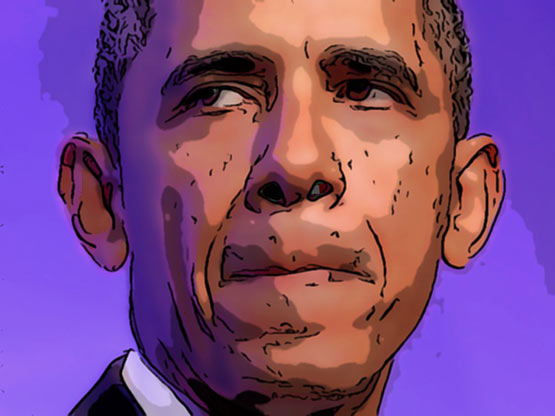
President Barack Obama will leave office having failed to use the tools at his disposal to make significant progress on getting child soldiers off the battlefield. That's the consensus among human rights groups who point to the fact that for six consecutive years, the Obama administration has subverted U.S. law requiring the president to sanction foreign governments that force children to fight.
As early as this week, the administration will announce for the final time a list of waivers and exemptions to the Child Soldiers Protection Act, a law passed in 2008 that forbids the United States from giving military aid to any foreign government that systematically uses children in its armed forces. According to officials involved in the process, the president will either fully or partially waive sanctions for every abuser country that receives U.S. military assistance.
It's a familiar pattern the president has followed each year since 2010, the first year he was required to sanction abuser countries under the law. The Obama administration has given more than $1.2 billion in military assistance and arms to governments that use child soldiers since the law was enacted and withheld only $61 million, according to the Stimson Center. The president's final decision on waiving sanctions under the law is due Oct. 1.
"This is Obama's last chance to get it right," said Jo Becker, advocacy director of the children's rights division at Human Rights Watch. In a Sept. 14 letter, several advocacy groups urged Obama to use the law in his final year to help end the practice.
Administration officials told me that no final decisions have been made, but that following an interagency process Obama is expected to fully or partially waive sanctions for Burma, the Democratic Republic of the Congo, Iraq, Nigeria, Somalia and South Sudan, all under the justification of "national interest." Waivers are not required for the other countries identified by the State Department's own reporting on human trafficking as using child soldiers because they don't receive U.S. military aid. These are Sudan, Syria and Yemen.
The child advocacy community finds South Sudan to be a particularly egregious example as that government, which is slated to receive $30 million in U.S. assistance related to peacekeeping operations in 2017, has drastically increased recruitment of child soldiers amid a deepening crisis, often conscripting them by force.
Administration officials have repeatedly used partial waivers for South Sudan, and the president will issue another one this year, an administration official said. The leeway is meant to allow support for peacekeeping to continue and to maintain some leverage and influence with a government the United States has long supported.
"We are not seeing change," said Rachel Stohl, senior associate at the Stimson Center. "There's no evidence partial waivers have worked to change South Sudan's poor behavior and impunity."
Afghanistan, which also saw a rise in the use of child soldiers this year, was not even included on this year's list of countries eligible to be sanctioned. The State Department's legal office made an unprecedented and highly controversial ruling that, because the abuses occur largely in the Afghan National Police, rather than the army, the practice doesn't meet the legal definition of "armed forces" under the law.
"They did bureaucratic somersaults to claim that the groups using child soldiers in Afghanistan are not government supported groups," said Stohl.
Supporters of the administration point to some limited successes in the effort to pressure countries to demobilize child soldiers. Ben Marter, a spokesman for Sen. Richard J. Durbin, D-Ill., one of the law's original champions, told me that waivers have led to positive government action in Chad. Other officials also point to Congo, which has greatly reduced its use of child soldiers.
There are also distinctions made between types of military aid. For example, waivers are often issued for aid used to train foreign military officers because such training can be valuable to the effort to professionalize these militaries and build constructive relationships. Aid is also seen by the administration as a carrot to be dangled; Burma does not receive direct military assistance but will get a full waiver this year as a signal that the United States hasn't ruled out the idea.
Still, even supporters of limited waivers believe the administration has gone too far. "There are some habitual violators that at some point seem no longer worthy of this approach," Marter said.
When the administration announces its final list of waivers, it will cement the president's shameful legacy on child soldiers. In his narrow construction of U.S. "national interest," Obama has undermined Congress's efforts and missed his opportunity to significantly help the vulnerable victims of this abhorrent practice.
Comment by clicking here.
Josh Rogin is a columnist for the Global Opinions section of The Washington Post. He writes about foreign policy and national security.
Previously:
• 08/16/16: Allies unite to block an Obama 'legacy'
• 07/26/16: Hillary must convince voters the world is not falling apart
• 07/12/16: House GOP to pass new Iran sanctions
• 07/05/16: Obama can't ignore Russia, or its increasingly horrendous behavior
• 06/28/16: Russia is harassing US diplomats all over Europe
• 05/18/16: Hillary plans to use Iran playbook on N. Korea
• 05/12/16: Republicans want Trump to 'evolve' on foreign policy
• 05/11/16: Washington doesn't work the way people think it does. And when the public gets a peek, there's a lot of outrage
• 04/26/16: When it comes to Russia, what's good for the Trump Organization isn't necessarily good for U.S.
• 04/19/16: U.S. is scrambling to keep Saudis in the fold
• 03/29/16: Russia 'weaponizing' migration to destabilize Europe
• 03/08/16: National Security all-star team backs Rubio
• 03/07/16: Hillary takes aim at another government watchdog
• 02/18/16: Congress wary of Chinese deal for Chicago Exchange
• 02/16/16: Obama weighs looser rules for Iranian travelers
• 02/15/16: Revealed: Hillary building her own national security council
• 02/02/16: Revealed: The Trump foreign policy doctrine
• 01/27/16: Bergdahl defense could call his loudest foe, Trump
• 01/07/16: Why when North Korea forces Obama's Washinton to pay attention all the U.S. government can do is grieve
• 01/06/16: Obama's Mideast balancing act tilts to Iran
• 12/28/15: Assad is reaching out to Washington power brokers
• 12/23/15: U.S. quietly negotiating to free Americans in Syria
• 12/21/15: Russian arms in Syria keep U.S. grounded
• 11/17/15: Assad's Paris win
• 11/12/15: The Pentagon's lonely war against Russia and China
• 11/05/15: Iran, Saudi Arabia clash inside Syria talks
• 10/28/15: U.S. is driving Mideast allies to Putin
• 10/26/15: Source of Hillary's Libya data a mystery
• 10/21/15: Team Jeb calls out Trump for trashing Freedom Tower
• 09/23/15: Xi visit marks downturn in US-China relations
• 08/31/15: Walker stakes his territory on foreign policy
• 06/08/15: Hillary just lost one of her only selling points
• 03/02/15: An Obama deal with Iran could die with his days in office
• 02/23/15: Shock, awe and Jeb Bush's foreign policy dream team
• 01/22/15: At GOP pow-wow 2016 front-runners pledge, lay out vision to restore America's world leadership role


 Contact The Editor
Contact The Editor
 Articles By This Author
Articles By This Author
